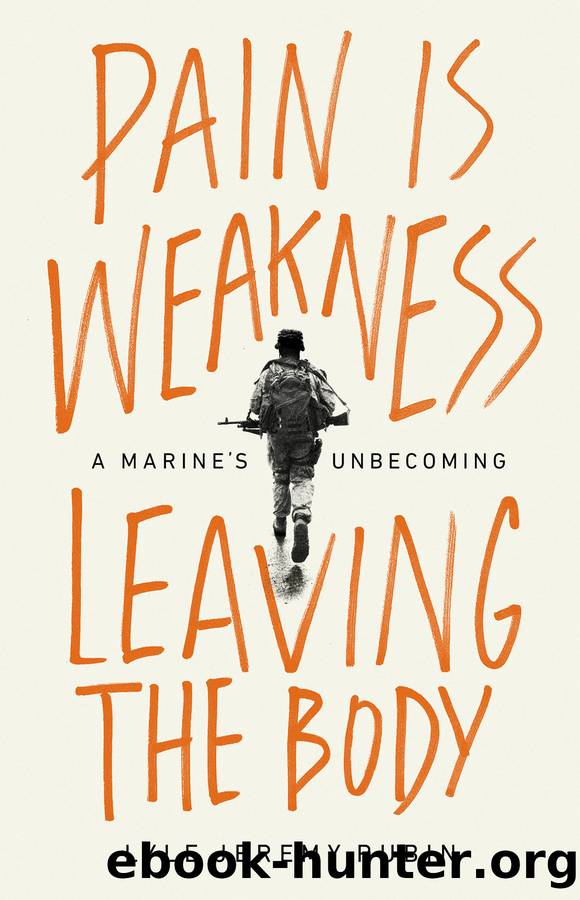Pain Is Weakness Leaving the Body by Lyle Jeremy Rubin

Author:Lyle Jeremy Rubin [J, Lyle Rubin]
Language: eng
Format: epub
Publisher: PublicAffairs
Published: 2022-11-02T00:00:00+00:00
I was determined to become not only a marine officer but also a good one, irrespective of the politics surrounding my commission. I had no control over the stratagems of the Defense Department or the machinations of the CIA, but I would take command, in the not so far off future, of my own little platoon. I intended to conduct myself with the utmost proficiency, and so I set about perusing the relevant literature.
When flipping through the Corpsâ Warfighting manual, commonly referred to as MCDP 1 (Marine Corps Doctrinal Publication 1), I was struck by its philosophical influences. It was a stealth crash course in modernity that began with a Pragmatist tutorial on democratic deliberation:
War is thus a process of continuous mutual adaptation, of give and take, move and countermove. It is critical to keep in mind that the enemy is not an inanimate object to be acted upon but an independent and animate force with its objectives and plans.
It proceeded through the mirage of dualism, the hard-nosed counsel of the Nazi legal theorist Carl Schmitt, the poststructuralist iconoclasm of Michel Foucault, the strategic chaos of the situationist Guy Debord, the right-libertarianism of Friedrich Hayek, on the one hand, and the left-libertarianism of Noam Chomsky, on the other. Next, the spurning of the McNamara Fallacy, the Ivy-educated faith of business executives and government officialsâfrom Robert McNamara to Donald Rumsfeldâthat success can be secured through the aggregation of quantifiable data. And, finally, somersaulting backward to hints of Leo Tolstoyâs pacificism and Friedrich Nietzscheâs will to power. If the goal was to survey competing twentieth-century visions of the modern predicament from the white male canon, the Corps could scarcely have done better.
My highlighted sections in the Leading Marines pamphlet were just as telling: âThere is yet another element of being different that defines Marines, and that is selflessness.⦠Any man in combat who lacks comrades who will die for him, or for whom he is willing to die, is not a man at all. He is truly damned.⦠Marines, far flung, performing dangerousâsometimes apparently meaningless and often overlookedâmissions find strength and sense of purpose simply knowing that they are Marines in that mystical grouping they know as the Corps.â
I still wanted to live up to the legend then. More to the point, I didnât want to let my fellow marines down, specifically those who would be relying on my leadership. But I was also in the process of understanding many themes that would later preoccupy me: the paradox of achieving self-worth and self-aggrandizement through self-sacrifice; the highest form of mutuality, of existence even, necessitating carnage. Oneâs willingness to take lifeâoneâs own or anotherâsâcounts as lifeâs most precious benediction. In the absence of this ethos one becomes condemned, and that Longfellow got it backward. It doesnât matter the cause of the slaying, or even its ultimate end. What matters is the slaying itself. To kill a brother, or to be killed by a brother, is not to violate the covenant of brotherhood but to affirm it.
Download
This site does not store any files on its server. We only index and link to content provided by other sites. Please contact the content providers to delete copyright contents if any and email us, we'll remove relevant links or contents immediately.
Machine Learning at Scale with H2O by Gregory Keys | David Whiting(4292)
Never by Ken Follett(3937)
Harry Potter and the Goblet Of Fire by J.K. Rowling(3848)
Unfinished: A Memoir by Priyanka Chopra Jonas(3381)
Fairy Tale by Stephen King(3370)
The Man Who Died Twice by Richard Osman(3072)
Will by Will Smith(2907)
Rationality by Steven Pinker(2352)
It Starts With Us (It Ends with Us #2) by Colleen Hoover(2339)
Can't Hurt Me: Master Your Mind and Defy the Odds - Clean Edition by David Goggins(2323)
The Dark Hours by Michael Connelly(2300)
The Storyteller by Dave Grohl(2228)
Friends, Lovers, and the Big Terrible Thing by Matthew Perry(2219)
The Dawn of Everything: A New History of Humanity by David Graeber & David Wengrow(2191)
The Becoming by Nora Roberts(2188)
The Stranger in the Lifeboat by Mitch Albom(2113)
Cloud Cuckoo Land by Anthony Doerr(2098)
Love on the Brain by Ali Hazelwood(2059)
Einstein: His Life and Universe by Walter Isaacson(2009)
